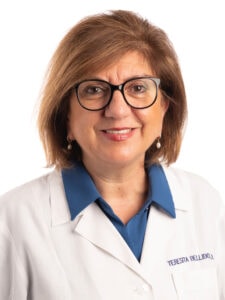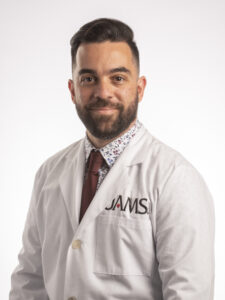Dr. Bellido and Dr. Delgado-Calle were featured by the ASBMR about their Hispanic heritage. Read their testimonies below.
Teresita Bellido, Ph.D.
 Professor and Chair, Physiology and Cell Biology Department, University of Arkansas for Medical Sciences
Professor and Chair, Physiology and Cell Biology Department, University of Arkansas for Medical Sciences
I earned my B.S. and Ph.D. degrees in Biochemistry at Universidad National Del Sur, in Bahia Blanca, Argentina, a city on the Atlantic Ocean where Patagonia starts; and moved to the U.S. to gain postdoctoral training. It was at American universities and through my involvement with the ASBMR, that I developed full appreciation of the globality of the scientific community and the value of being open to diverse points of view to reach complete understanding of biological and health pursuits. I am a basic and translational researcher aiming to understand the mechanisms by which systemic hormones regulate the cells of bone and muscle. I had the fortune of being trained by talented and motivating mentors and guided by a strong and collegial scientific network.
The ASBMR became my hone society since my arrival to the U.S. ASBMR provided opportunities to present my scientific work and also to channel my mentoring and service interests as a volunteer leader. The ASBMR Young Investigator Award was my first international prize and the beginning of a series of scientific accolades for me and for members of my research laboratory through the years. Now, ASBMR is also the home society for my mentees and their respective research laboratories.
I volunteered for ASBMR first as an ad hoc member of the Education committee and, over time, I have served in many capacities: as chair of Education, chair of the Women committee, and council member. My election as president in 2020, the only woman ASBMR President of Hispanic origin yet, marked the peak of my service. One of my favorite achievements as volunteer leader is the ASBMR Ambassador Program, which was inspired by my Hispanic heritage, and which I initiated in Argentina. This program is based on principles of inclusion of all members and rapidly extended to other South and North American countries, including Chile, Brazil, Mexico and Canada, and to Europe, Asia, and Australia. As a scientist and ASBMR member, I am proud of my Hispanic heritage and of being a member of ASBMR, a society that embraces members of diverse cultures and recognizes their scientific contributions. I believe my Hispanic heritage gives me strength and determination to maintain an inquisitive mind and embrace innovation.
Jesús Delgado-Calle, Ph.D.

Jesús Delgado-Calle, Ph.D.
Associate Professor, Physiology and Cell Biology at the University of Arkansas for Medical Sciences
I was born and grew up in Santander, a small town in northern Spain nestled between mountains and the beach. Spain’s rich cultural mix, shaped by its unique geography and history, has profoundly influenced my life. I earned my Ph.D. from the University of Cantabria, Spain. My scientific career has further deepened my appreciation for cultural diversity. During my Ph.D. I had the privilege of conducting research visits across various European labs, which exposed me to different cultures.
After completing my Ph.D., I moved to the U.S. to advance my scientific career at the University of Indiana School of Medicine, where I investigated the impact of cancer on bone. Attending ASBMR annual meetings has significantly broadened my scientific network and cultural exposure. These interactions with basic and physician-scientists, coupled with my training and passion for medical care, inspired me to pursue translational research in cancer and bone biology – an area that now defines my work at the University of Arkansas for Medical Sciences.
Hispanic heritage, or being Spanish, is a core part of my identity. It transcends language, nationality, and symbiosis; it represents a blend of diverse cultures and a strong sense of community. It involves maintaining close-knit family bonds, playing soccer not just for exercise, but for camaraderie, and appreciating Spanish guitar music not only for its beauty but for its ability to bring people together. It means recognizing and respecting the varied traditions and languages within my country and those of my colleagues. This heritage is integral to my personal identity and worldview. I draw from it to lead my lab, promoting teamwork, diversity, and cultural appreciation. I am grateful to ASBMR for the opportunity to share my heritage with the scientific community and, as a Council member, contribute to building a society enriched by robust cultural values.
